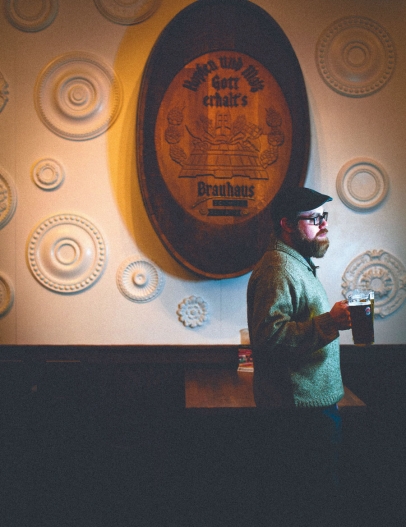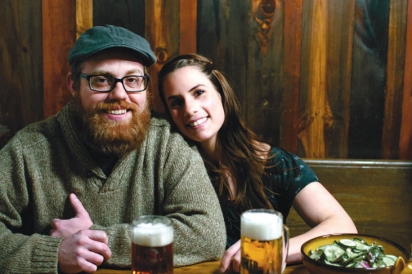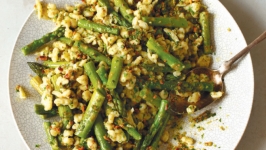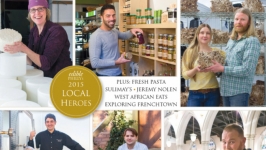Beyond the Biergarten
Chef Jeremy Nolen on his new cookbook and restaurant
To all those tweezer-wielding, molecular-chemistry-obsessed chefs out there, Jeremy Nolen responds with a more straightforward mantra: “It’s just cooking.” This catchphrase has served the 37-year-old executive chef at Brauhaus Schmitz well as he has carved out his own spot on the local restaurant roster. Nolen, who helms the kitchen at one of Philadelphia’s busiest—and biggest—independent restaurants, as well as its sibling Wursthaus Schmitz stall at Reading Terminal Market, is turning up the heat this year. He has just released his first cookbook, New German Cooking: Recipes for Classics Revisited (Chronicle Books), and will soon open a second restaurant called Whetstone in Queen Village.
On an early winter day, Nolen is giving me a preview of some of Whetstone’s potential menu items, just ahead of the first tasting for friends and associates. For this neighborhood-friendly corner spot at 5th and Bainbridge streets, Nolen is expanding beyond his signature German focus to include a range of American—and local—tastes. Dishes in the running include a deconstructed South Philly—style roast pork loin sandwich with provolone polenta and broccoli rabe; brandade-based fish sticks, accompanied by tartar sauce and pickled veggies; and a cauliflower and shiitake mushroom gratin served in personal- sized cast iron skillets.
Meanwhile, a private party in Brauhaus’s Brauer Bund room is turning up the oompah, and protesters from the electricians’ union are picketing outside, because Whetstone’s build-out is being done with nonunion labor. Nolen, clad in the modern-day chef uniform of baseball cap and T-shirt, a look accented by dark-framed glasses, a trim beard and a partial tattoo sleeve on his right arm, seems unfazed by the swirl of activity.
His game face isn’t an act, according to his pastry chef wife, Jessica Nolen, who besides being his life partner and the mother of one of his children is also his professional collaborator. They met nearly a decade ago on the line at a French bistro called Coquette that once occupied the same space as Whetstone. His ability to stay focused in the midst of the typical kitchen chaos first attracted her. “I only saw him get upset once,” she recalls. “He was always calm.”
As Nolen’s star has risen, he has managed to maintain the same unflappable attitude, while charting an ambitious course with an approach to German cooking that respects the traditional while embracing the modern. Hank Shaw, a blogger and author of the cookbook Duck, Duck, Goose, came away impressed by Nolen’s quiet resolve after collaborating with him on a dinner at Brauhaus Schmitz in the fall of 2013. “He’s low-key, he’s not a screamer, he’s not a camera hound,” Shaw says. “He’s interested in cooking food to eat and enjoy with friends. It doesn’t mean it can’t be innovative. But at the end of the day, a plate of food is just a plate of food.”
Family business
Like many rock star chefs, Nolen actually wanted to be a real rock star. He played guitar in bands during his teens and 20s in the Reading area, with one—an ‘80s cover group called Super Bang— even getting signed to a management deal. But he has always known his way around a kitchen, courtesy of his father, Ron, a professional chef who schooled his son on the essentials and had him work alongside him. At the same time, Ron Nolen urged his son not to follow in his footsteps.
“I grew up with my dad telling me not to be a chef—he tried to steer me out of it,” Jeremy recalls. “I didn’t necessarily want to be a chef at that time. I was still pursuing a career in music.”
Germany was never too far from Jeremy Nolen’s mind—his experiences included growing up, as many kids in the heavily German-American area of Berks County do, on liverwurst sandwiches; traveling to Germany for Oktoberfest; and, most importantly, cooking at the Reading Liederkranz, a private German club and restaurant in that city. “There are some things you are just drawn to and don’t know why,” Nolen says. “I was naturally drawn to German culture and food.”
By his mid-20s, Jeremy had become a father himself and realized music wasn’t going to pan out. He was living in the Lehigh Valley at the time, and couldn’t find a restaurant job there, so he moved to Philly in 2006. He landed first at Bridget Foy’s, helped open 707 (in the Rosa Blanca space) and then arrived at Coquette. The latter couldn’t sustain its initial hype, but led to the Nolens’ more lasting collaboration. Jessica Nolen, who is the pastry chef for both Brauhaus and Whetstone and the coauthor of the cookbook, describes the two as being kindred culinary souls. “We have almost the exact same style of cooking, which is what made it click right away,” she says. “We’re interested in good food, no frills, nothing crazy. No molecular gastronomy stuff—we like the simple things about food.”
By 2009, he and Jessica were thinking about opening their own German-style restaurant when they found about Doug and Kelly Hager’s plans for a similar concept. Teaming up with the Hagers, Nolen fashioned a restaurant that balanced being a party-hearty beer hall serving the three “S” staples—sausage, schnitzel, sauerkraut—with more refined dishes like pan-seared branzino with a vegetable vinaigrette or mushroom strudel with smoked barley in a caramelized onion sauce.
“We do a lot of big parties—you get a table of 12, there always are one or two that have never had German food or haven’t had a good experience, so they will order something nontraditional. Or people who don’t have experience with German food will come for the beer and try the nontraditional stuff. Maybe they don’t want to eat sausage or are health-conscious.”
Rooted in authenticity
Nolen’s extensive research also has inspired him to look beyond the standards German immigrants brought over with them to revive recipes that were once popular, such as duck with pomegranate. “I found the recipe in a cookbook from the 1920s,” he says. “It’s contemporary even though the cookbook is 100 years old. You never see it on a traditional German menu.”
Le Virtù executive chef Joe Cicala met Nolen several years back when the two made a friendly wager when Germany played Italy in the Euro Cup. The loser (Nolen) had to cook at the other’s restaurant. The two found they are like-minded in their interest in mining authentic recipes from regional cuisines that often get pigeonholed as one-note, and have since collaborated on some special dinners. “We are kind of in the same boat,” Cicala says. “South Philly has a huge Italian-American population that has certain ideas about Italian food—they think it’s red sauce, but most have never been to Italy. He fights the same battles; because of Germans and the Pennsylvania Dutch, [customers] think it’s shoofly pie and things that are really from America.”
Having tried to change minds one schnitzel at a time at Brauhaus, Nolen is now seeking a larger stage via his new cookbook. New German Cooking offers 100 recipes, spanning traditional breads, meats and noodle dishes, through more unexpected entries for fish dishes like panfried mackerel with parsley-caper brown butter and riffs on familiar desserts, like cheesecake made with quark cheese and a pretzel crust.
As the Nolens note in the introduction, “For far too long, German cooking has been underrated outside of its national boundaries, and this book aims to change that. New German Cooking celebrates the flavor, freshness, variety, and seasonality of German cuisine.” According to Shaw, their effort is part of a “second wave” of German cooking, reflecting the country’s appreciation of fine food. “It’s not for nothing that Germany has more Michelin-starred restaurants than any other country,” Shaw says.
The next (American) chapter
For Whetstone, Nolen is again looking to reinvent a familiar format— in this case the neighborhood tavern. The idea is to offer his take on classics like a steak frites, roasted salmon, lemon meringue pie and other approachable items. A dozen American and Belgian beers on draft, plus an emphasis on wine and cocktails, further set it apart from Brauhaus.
Having seen what happened to Coquette and subsequent spots at the same location that quickly went belly up, Nolen is thinking for the long term with Whetstone. Although he claims not to believe that certain locations can be cursed, he gutted the space anyway. Whetstone is going for an urban farmhouse look, with windows that open, a row of banquettes and a tile floor styled to look like wood. “I don’t want to be the hot restaurant for five months and then fade away,” he says.
As one who presides over much noise—Brauhaus hosts an annual Oktoberfest block party that closes down the entire 700 block of South Street with drunken revelers—Nolen revels in the chance to enjoy the quiet of fly-fishing on the tranquil waters of the upper Schuylkill River. “It’s a way to disconnect,” he says of his favorite pastime. This spring and summer, Nolen will likely have to put off making his regular escape, as his dueling kitchens will be calling. But he can leave the tweezers at home.
BRAUHAUS SCHMITZ
718 South St., 267.909.8814 brauhausschmitz.com
WHETSTONE (opening soon)
700 S. 5th St., 267.909.8814
WURSTHAUS SCHMITZ
Reading Terminal Market, 51 N. 12th St., 215.922.4287








